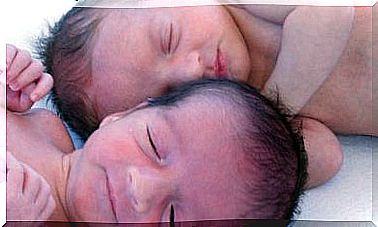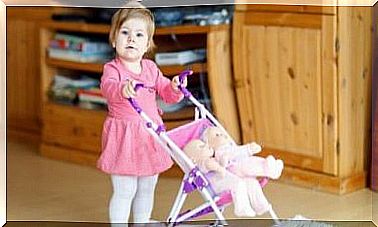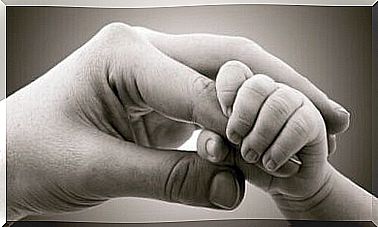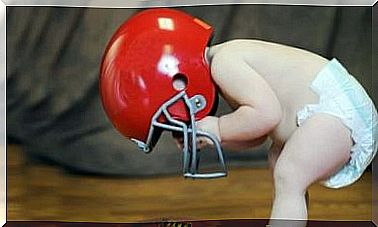Is It True That Babies Cry In Their Sleep?

Many moms wonder if babies cry in their sleep, because the baby’s sleep is a cause for great concern. The infant’s rest influences the change in mood and behavior. It also has a major impact on the well-being of parents.
First of all you should keep in mind that if the baby wants to communicate with you, he will do so by crying or complaining. Therefore, he tends to cry to let you know something that is happening and that requires your attention.
Sometimes the baby’s crying may have woken you up in the middle of the night and you thought it needed you. To your surprise, this was not the case, because his eyes were still closed and he was sleeping. This situation is more common than you imagine, but many parents don’t know what to do in these cases where babies cry in their sleep.
Why do babies cry in their sleep?
In the first few years of life, it is normal for the baby to wake up frequently during the night. Babies have a different sleep cycle than adults.
Often, babies have difficulty sleeping even if they are exhausted; this leads them to cry while they sleep. Some even try to go back to sleep, but they can’t because they don’t know how to do it. The reason? they need you.
Just like adults, they dream and most of their dreams are associated with their experiences.
Sleep disturbances in infants
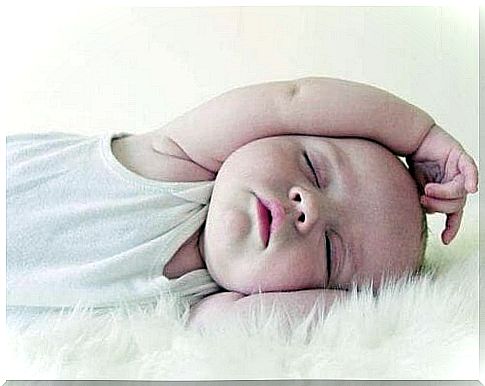
The newborn goes through several stages of sleep that are part of its development process, such as nocturnal awakenings. These can be mild, such as when the newborn makes a hiccup or a soft groan.
However, more persistent and distressing crying may occur which, therefore, causes more disturbance in the newborn. These cases are known as night terrors.
In both circumstances, the same behavior is repeated: when the mother arrives to take care of the newborn, she realizes that, even if she is crying, she is still sleeping. This disorder occurs when the baby is in a phase of slow sleep, called Non-REM.
In the Non-REM phase, the newborn is immersed in a deep sleep. Therefore, he cannot fully wake up and is not fully aware of what is happening.
When babies cry in their sleep they may feel agitated, confused and frightened and are unable to react to external stimuli. Night terrors are short lived. They last a few minutes, until the baby falls asleep again.
On the other hand, if it is a confusional awakening, it may take 5 to 15 minutes. If you try to comfort the baby, the situation gets worse and the episode gets longer.
What to do to calm a baby crying in his sleep?
If the baby is crying but his eyes are closed, the ideal is to be patient, wait and observe. Just because he cries or makes noises doesn’t mean he’ll wake up. As long as his eyes are closed, it is a sign that he is still sleeping.
It is essential to pay attention to the sound of crying when babies cry in their sleep. This will help you understand what they need. They may be cold or hungry and if their basic needs are not met, they will not be able to fall back asleep quickly. It is essential that you deal with this right away so that they feel better.
When these awakenings occur at dawn, it will be necessary to act calmly and silently so as not to wake up the newborn more. Pay attention to his needs calmly and avoid turning on very bright lights so that he understands that during the night he must sleep.
Finally, consider that if the baby makes any noise during sleep, it is absolutely normal. On the other hand, if the baby is crying or complaining, you should try to figure out whether he is awake or not.
Advice for parents
The most important advice is not to try to wake the baby up during these nocturnal incidents. A key strategy is to remain silent with him and wait for him to calm down.
In short, these awakenings can occur spontaneously, but they can also be caused by some external stimuli. For example, they could be caused by persistent noise or a change in bed position. Hence, it is recommended to avoid any kind of disturbance during the hours of rest.
